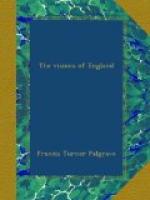And as in lands once flourishing,
now forlorn,
And desolate capitals, the traveller
sees
Wild tribes, in ruins from the ruins
torn
Hutted like beasts ’mid marble
palaces,
Unknowing what those relics mean,
and whose
The goblets gold-enchased
And images of the gods the broken vaults disclose;
So in the Mid-age from the Past
of Man
The Present was disparted; and they
stood
As on some island, sever’d
from the plan
Of the great world, and the sea’s
twilight flood
Around them, and the monsters of
the unknown;
Blind fancy mix’d
with fact;
Faith in the things unseen sustaining them alone.
Age of extremes and contrasts!—where
the good
Was more than human in its tenderness
Of chivalry;—Beauty’s
self the prize of blood,
And evil raging round with wild
excess
Of more than brutal:—A
disjointed time!
Doubt with Hypocrisy
pair’d,
And purest Faith by folly, childlike, led to crime.
O Florentine, O Master, who alone
From thy loved Vergil till our Shakespeare
came
Didst climb the long steps to the
imperial throne,
With what immortal dyes of angry
flame
Hast blazon’d out the vileness
of the day!
What tints of
perfect love
Rosier than summer rose, etherealize thy lay!
—Now, as in some new
land when night is deep
The pilgrim halts, nor knows what
round him lies
And wakes with dawn, and finds him
on the steep,
While plains beneath and unguess’d
summits rise,
And stately rivers widening to the
sea,
Cities of men
and towers,
Abash’d for very joy, and gazing fearfully;—
New worlds, new wisdom, a new birth
of things
On Europe shine, and men know where
they stand:
The sea his western portal open
flings,
And bold Sebastian strikes the flowery
land:
Soon, heaven its secret yields;
the golden sun
Enthrones him
in the midst,
And round his throne man and the planets humbly run.
New learning all! yet fresh from
fountains old,
Hellenic inspiration, pure and deep:
Strange treasures of Byzantine hoards
unroll’d,
And mouldering volumes from monastic
sleep,
Reclad with life by more than magic
art:
Till that old
world renew’d
His youth, and in the past the present own’d
its part.
—O vision that ye saw,
and hardly saw,
Ye who in Alfred’s path at
Oxford trod,
Or in our London train’d by
studious law
The little-ones of Christ to Him
and God,
Colet and Grocyn!—Though
the world forget
The labours of
your love,
In loving hearts your names live in their fragrance
yet.
O vision that our happier eyes have
seen!
For not till peace came with Elizabeth
Did those fair maids of holy Hippocrene
Cross the wan waves and draw a northern
breath:
Though some far-echoed strain on
Tuscan lyres
Our Chaucer caught,
and sang
Like her who sings ere dawn has lit his Eastern fires;—




